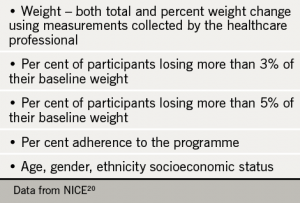The following programmes currently available in the UK have been shown to be effective at 12 to 18 months; (in alphabetical order) Rosemary Conley, Slimming World and Weight Watchers.20
Many health authorities have also set up their own weight loss programmes and health care professionals should be aware of what is available locally and ensure it meets best practice standards as specified by NICE. Nationally the Counterweight Programme34 is available on the NHS and organisations, such as the National Obesity Forum give advice and support.
Self-referral is most usual to commercial weight loss programmes but referral on the NHS /public health with vouchers (commonly commissioned in 12 session blocks) is possible now in many regions, as a tier 2 service provider. Referral criteria are set at local level with each health authority working out its own pathway and eligibility criteria for referral. A case study example from Hampshire is included (see appendix on Hampshire). Primary care should ensure that any local programmes developed meet the core component criteria recommended by NICE and have evidence that they are able to deliver outcomes of at least 60% of participants completing the programme with an average weight loss of 3% (with at least 30% or participants losing 5% of body weight). (Completion is measured as participants attending at least one of the last three sessions of the intervention.) The Lighten UP study35 showed that group sessions rather than individual sessions led to a much higher proportion of referrals attending. Discuss the likely cost with individuals once any funded referral period has ended.
 There is mixed evidence for the effectiveness of exercise programmes for weight loss and so if exercise on referral is offered then ensure some additional support is offered for weight management.
There is mixed evidence for the effectiveness of exercise programmes for weight loss and so if exercise on referral is offered then ensure some additional support is offered for weight management.
Monitor and motivate
People should be encouraged to monitor themselves with regular self-weighing and should also keep a diary of weight and key measurements (such as their BMI and/or waist measurement). Keeping a food diary can also be a useful tool to help understand which events trigger eating and thus which behaviour needs modifying. A pedometer can be useful to help reach/record physical activity targets.
For any programme to succeed, motivation and encouragement are needed throughout and should be offered at every opportunity. People should be encouraged to seek help in attaining their goals from other family members and friends as well as health care professionals.

Signposts to further information
Recommend good sources for obtaining further information. These can be invaluable in helping people attain their goals. There are many useful websites with practical advice, tips and downloadable tools to support people wanting to make lifestyle changes and lead healthier lives. These include NHS Choices, Change4Life, the British Heart Foundation and Cancer Research UK.
Follow-up

Offer regular long-term follow up by a trained professional. Health care professionals should monitor and provide support and care to their patients with a minimum follow-up period of 12 months.3 Good record keeping should be kept by the professional not only to ensure continuity of care but for the monitoring and evaluation of programmes locally and nationally (see table 8).
Maintenance
At the end of any weight loss programme, people should be followed-up for at least 12 months to find out how they adhering to the lifestyle changes they have made and whether there has been any weight regain. Advice, support and encouragement can be offered and their situation re-assessed for further treatment or referral. Weight management is a long-term process and re-referral on to programmes should be offered if necessary.
